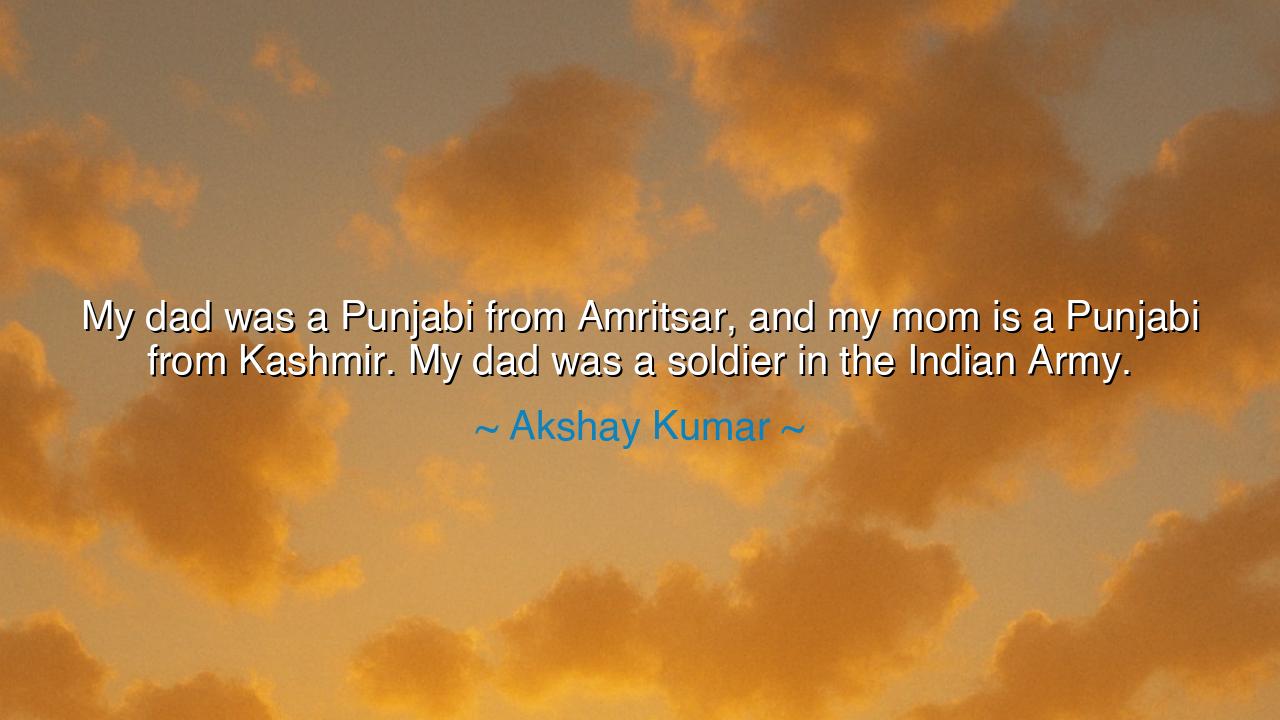
My dad was a Punjabi from Amritsar, and my mom is a Punjabi from
My dad was a Punjabi from Amritsar, and my mom is a Punjabi from Kashmir. My dad was a soldier in the Indian Army.






Hearken, O seekers of wisdom, and attend to the words of Akshay Kumar, a voice forged by heritage and discipline, who recounts: “My dad was a Punjabi from Amritsar, and my mom is a Punjabi from Kashmir. My dad was a soldier in the Indian Army.” At first glance, these words may appear as simple facts of lineage, yet beneath them lies a profound meditation on heritage, courage, and the shaping of character through family and duty. The ancients understood that a person is not born alone; they are molded by ancestry, culture, and the sacrifices of those who came before.
Kumar begins with the principle of honoring one’s roots. His father, a soldier from Amritsar, embodied discipline, valor, and service to the nation, while his mother, from Kashmir, carries the traditions, values, and resilience of her land. History teaches us that understanding one’s origin provides both grounding and inspiration. Consider the Spartan youth, trained from birth to honor the lineage of warriors before them, drawing strength from ancestry while preparing to shape their own legacy.
The essence of this wisdom lies in the transmission of values across generations. A soldier’s life is one of sacrifice, courage, and duty, and these principles do not end with service—they echo into the household and shape the children who witness them. Akshay Kumar, raised by a father steeped in military discipline, would have absorbed lessons of perseverance, respect, and fortitude. In this, we see that heritage is more than blood—it is the living example of principles enacted daily.
Kumar’s reflection also speaks to the blending of cultures and regions in shaping identity. Being born of parents from Amritsar and Kashmir, he carries the heritage of diverse lands and traditions, each contributing to his moral and cultural foundation. History shows that such convergence often produces resilience, adaptability, and perspective. The Mughal emperors, for instance, drew upon diverse cultural traditions to govern vast realms, demonstrating that heritage can both enrich and strengthen character.
The quote further illuminates the nobility of service and discipline. A father in the army exemplifies courage not merely in combat, but in devotion to duty, the prioritization of collective well-being over personal ease. Consider the story of Captain Vikram Batra, a modern Indian hero, whose commitment and courage in the Kargil War inspired a generation. Akshay Kumar’s acknowledgment of his father’s military life reveals that such examples shape character, teaching values that endure far beyond the battlefield.
From this reflection emerges a practical teaching: recognize and honor the sacrifices and virtues of one’s parents and ancestors. Learn from their courage, discipline, and resilience, and allow these principles to guide your own path. Heritage is not merely an inheritance of blood, but a legacy of moral and practical wisdom that can illuminate choices, inspire action, and strengthen resolve.
Practically, this calls for reflection and application: observe the discipline and dedication of those who came before, cultivate virtues they exemplified, and apply these lessons in daily life. Whether through work, service, or relationships, honor your lineage by living in accordance with the principles that shaped it.
Thus, let it be known: one’s heritage and family shape the foundation of character, courage, and purpose. Walk through life with gratitude for the sacrifices of your forebears, with humility before their accomplishments, and with the courage to extend their legacy. In this awareness, the soul is fortified, values are nurtured, and the spirit carries forward the strength of generations past.






AAdministratorAdministrator
Welcome, honored guests. Please leave a comment, we will respond soon